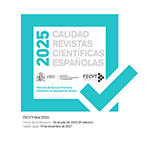History of Mabrūka. A century of uncertainties about slavery in Tetouan, Morocco
Abstract
In this paper we analyze the uncertainties of the final period of slavery in Morocco through the life story of Mabrūka, who was bought in Tetouan in 1927 and died in 1996. We reconstruct her life journey from the documents kept by the descendants of the Medina family who bought her and from an oral survey among the members of the family, in order to show the changes experienced in Mabrūka’s life and her own social agency, as a contribution to the new approaches to slavery. The main conclusions are that the process of manumission of slaves remained in limbo in the absence of a formal abolition of slavery and the silences about Mabrūka’s life confirm these uncertainties. On the other hand, Mabrūka maintained a sentimental bond with the Medina family, even after beginning her life as a free woman, and shortly before her death she bequeathed her property to the purchasing family, since she was convinced that a walā’ bond persisted between them. This gesture provoked a legal short-circuit when the Council of Ulemas of Tetouan evidenced the juridical nebula on slavery and declared the link between the freedwoman and the purchasing family non-existent for legal purposes.
Downloads
Article download
License
In order to support the global exchange of knowledge, the journal Anaquel de Estudios Árabes is allowing unrestricted access to its content as from its publication in this electronic edition, and as such it is an open-access journal. The originals published in this journal are the property of the Complutense University of Madrid and any reproduction thereof in full or in part must cite the source. All content is distributed under a Creative Commons Attribution 4.0 use and distribution licence (CC BY 4.0). This circumstance must be expressly stated in these terms where necessary. You can view the summary and the complete legal text of the licence.










